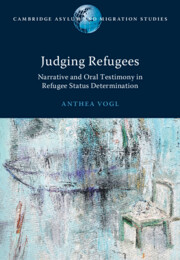Book contents
- Judging Refugees
- Cambridge Asylum and Migration Studies
- Judging Refugees
- Copyright page
- Contents
- Foreword
- Acknowledgements
- Abbreviations
- 1 Introduction
- 2 Law, Literature and Narrative in the RSD Oral Hearing
- 3 How Did We Get Here? A History of the Oral Hearing in Australia and Canada
- 4 The Stock Narrative of Becoming a Refugee
- 5 Narrative Contest as Structuring the Oral Hearing
- 6 ‘I’ll Just Stop You There’: Fragmentation of Refugees’ Oral Testimony
- 7 Beyond the Demand for Narrative: Genres of Refugee Testimony
- 8 Conclusion
- Appendix
- Index
8 - Conclusion
Published online by Cambridge University Press: 15 March 2024
- Judging Refugees
- Cambridge Asylum and Migration Studies
- Judging Refugees
- Copyright page
- Contents
- Foreword
- Acknowledgements
- Abbreviations
- 1 Introduction
- 2 Law, Literature and Narrative in the RSD Oral Hearing
- 3 How Did We Get Here? A History of the Oral Hearing in Australia and Canada
- 4 The Stock Narrative of Becoming a Refugee
- 5 Narrative Contest as Structuring the Oral Hearing
- 6 ‘I’ll Just Stop You There’: Fragmentation of Refugees’ Oral Testimony
- 7 Beyond the Demand for Narrative: Genres of Refugee Testimony
- 8 Conclusion
- Appendix
- Index
Summary
The Conclusion returns to the book’s central questions and arguments. It considers the implications of the book’s findings for the conduct of oral hearings within RSD, and the impossibility of a just assessment of refugee applicants’ oral testimony against the current credibility criteria. While the aim of the book was not to advance precise reforms to RSD, in reflecting on what suggestions for reform arise, the Conclusion argues that if oral hearing must be a narrative occasion, it should be a more predictable one. Where applicants’ evidence is expected to fit within cognisable narrative forms, the hearing should provide the opportunity to meet these standards. However, such a reform would do nothing to address the narrative mandate traced and critiqued throughout the book. Finally, the Conclusion explores and holds open the possibility for certain texts and genres to present radical ways of imagining refugee narratives outside the strictures of refugee law, RSD and the extreme demands (and limits) currently placed on the testimony of refugee applicants.
Keywords
- Type
- Chapter
- Information
- Judging RefugeesNarrative and Oral Testimony in Refugee Status Determination, pp. 154 - 160Publisher: Cambridge University PressPrint publication year: 2024

